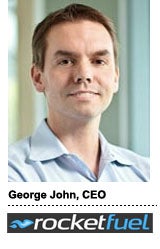Rocket Fuel is living up to its name in its first hours as a public company. After going public at $29, the high end of its range, the share price more than doubled to $62 by late morning. Since then it has fallen back to $55.50, as of noon EST, a 91% gain.
The running start suggests Rocket Fuel has done a good job telling its story and managing investor expectations. The ad network/demand-side platform raised $116 million, slightly more than the $102 million it originally hoped to raise at a share price between $24 to $27.
Some ad-tech industry observers had thought that Rocket Fuel’s estimated valuation of nearly $1 billion was too high, given the gross margin pressure faced by large-scale ad network business models — even programmatic ones. Clearly many investors disagree.
There was one hiccup in Rocket Fuel’s public introduction on Friday morning, as the Nasdaq, where Rocket Fuel is trading as “FUEL,” halted trading briefly, though it was not clear why.
If investors’ early enthusiasm for Rocket Fuel holds, that could be a good sign for Criteo’s long-awaited entry into the public markets; it filed its F-1 earlier this week. Criteo, a retargeting specialist, (though it didn’t mention that discipline in its SEC filing) hopes to raise $190 million from the stock sale and is aiming for a valuation of around $2 billion.
As with recent ad-tech IPOs in the digital video space from Tremor and YuMe, Redwood City, Calif.-based Rocket Fuel is going public before reaching profitability. But whereas both Tremor and YuMe have shrunk their gap between loss and profit, Rocket Fuel’s loss has only grown. The company ended last year with a net loss of $10.3 million and ended the first six months of 2013 with a loss of $11.9 million.











